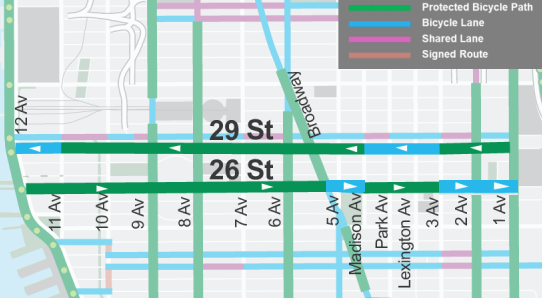DOT plans to add protected bike lanes on 26th Street and 29th Street in Manhattan, with other crosstown routes in the works for Midtown. The agency posted a presentation this afternoon that project managers will show later today at Manhattan Community Board 4 [PDF].
Cycling in Midtown is on the rise, but there are a lot of gaps in the area's protected bike network. Unprotected bike lanes aren't enough -- they're frequently blocked by motorists, forcing cyclists to weave into car traffic. Last year alone, motorists killed five people biking between 14th Street and 59th Street.
After Dan Hanegby and Michael Mamoukakis were struck and killed by charter bus operators on West 26th Street and West 29th Street, CB 4, Transportation Alternatives, and City Council transportation chair Ydanis Rodriguez called for protected bike lanes on crosstown streets.
The redesign DOT's presenting today will create parking-protected bike lanes on most blocks of 26th and 29th, with some gaps where the curbside bike lane will not have protection. DOT is also planning for two more crosstown pairs of protected bike lanes: one on 52nd Street and 55th Street, and another through the Times Square area (the exact street pair has yet to be selected). And last month, the agency announced plans to install a two-way protected bike lane on 13th Street ahead of the L train shutdown.
"Too many of the cyclist tragedies happened along Midtown streets without protected lanes," DOT Commissioner Polly Trottenberg said in a statement. "With its vibrant commercial activity, major transportation hubs and must-see tourist destinations, Midtown presents both great challenges and great opportunities for safer cycling."

In DOT's plan, the typical block of 26th Street and 29th Street will get a five-foot bike lane and two-foot buffer separated from car traffic by an eight-foot parking lane. It's narrow for a protected bikeway, especially one with a lot of bike traffic, though there is a precedent on Jay Street in Brooklyn.
The redesign varies on blocks that are wider or narrower than the typical cross-section. On 26th Street between Ninth and Eighth avenues, for example, the extra width allows for expanded pedestrian space and a wider bike lane and buffer.
Between First Avenue and Second Avenue, the bike lane will run along the curb but won't have any buffer or protection. And the five-foot unprotected painted lane on the westernmost block of 29th Street, between 11th Avenue and 12th Avenue, will not be upgraded.
At intersections, DOT is planning to use mixing zones to manage areas where turning drivers cross the bike lane. The agency recently added safer intersection designs to its bike lane toolkit but has been reluctant to use them widely.
With the protected bike lanes in place, double-parking on these streets would block car traffic. DOT's presentation says more no-parking zones will be added to maintain through routes for emergency vehicles, and notes that existing loading zones will have to be kept clear of illegal parking to facilitate deliveries.
You can learn more about the project and weigh in with DOT and local officials at tonight's Manhattan Community Board 4 transportation committee meeting, starting at 6:30 p.m. at Clinton Cameo Studios, 307 West 43rd Street.







